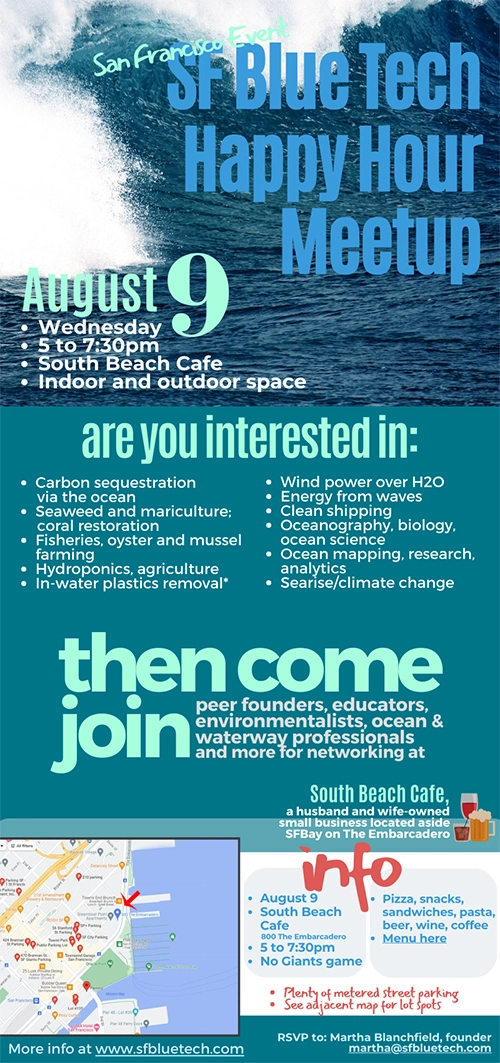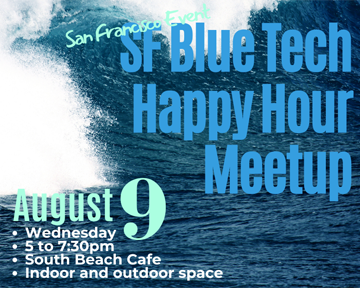Five years ago if the term ‘blue tech’ was used in discussion, most could reference Saildrone, Marine Mammal Center, Schmidt Ocean, maybe Baykeeper or San Francisco Estuary Institute; the list was small. Today, more are familiar our regional blue tech companies.
What is ‘Blue Tech?’
The Port of San Diego defines, “Blue tech is the advanced technology sector of the maritime industry which drives sustainable innovation across emerging markets of the Blue Economy. It includes a broad spectrum of industries and innovative technologies focused on promoting sustainable ocean activities.”
Blue technology companies include more than just ocean and aquaculture start-ups. The term is expansive, encompassing many entities working both proactively and reactively to address climate challenges.
On the proactive side, blue tech can be:
- Remedies for cities on the frontline for flooding due to searise
- New ways to develop power from waves and ocean winds
- Carbon sequestration using the ocean, coastline and plants that grow in and aside waterways
- Growing and harvesting vegetation and sealife for consumption by humans
- Robotics and deep sea exploration
- Less polluting over-water transportation and fuels
On the reactive side, blue tech can tackle:
- Pile-ups of plastic in oceans, waterways, littering the land and dumps
- Ways to reduce pollutants (synthetic fibers, chemical and oil-based) in air and waterways
- Tracking and/or reducing sewage leakage and toxic algae outbreak
- The decline in sealife, such as coral, kelp, abalone, phyoplankton, oysters, crab, salmon
Growth and Support Elsewhere
For the past five years I watched as other regions added groups, incubators and accelerators. It seemed illogical that this area, with its biotech talent, proximity to Silicon Valley and rich maritime culture, did not have on-ramps for San Francisco blue tech start-up companies.
Nor did it have an obvious support network similar to those created by Sea-Ahead on the East Coast and Gulf, AltaSea and TMA Blue Tech in Southern California or Seattle’s Washington Maritime Blue.
What San Francisco Bay Area does have are excellent marine education institutions, environmental firms, citizen activism, and many NGO, restorative agencies and non-profits.
Being Blue is a Good Thing
Good news is that in the past three to four years, there has been a notable increase in the number of local blue technology start-ups, as well as environmental justice and coastal restoration. There has also been a significant increase in interest for carbon and climate tech. It was time to make SF Blue Tech a reality.
- I share the vision on www.sfbluetech.com
- First meeting Wednesday, August 9
- 5 to 7:30pm
- South Beach Cafe, 800 The Embarcadero, San Francisco
The location is easy to find and there’s ample parking and both indoor and outdoor meeting space. Food available for purchase: pizza, pasta, sandwiches, beer, wine, espresso drinks and more.
Questions or wish to RSVP: [email protected]

We Welcome
- Scientists, biologists, oceanographers, tech and non-tech pros
- Data and statistics experts
- Ocean, estuary and water professionals and stewards
- Groups restoring ocean, coastal, wetland areas
- Students, educators
- Founders, angels, VCs, support companies
- Sailors, boaters, members of port and maritime trades
- Climate-concerned guests
- Anyone interested in removing plastics from the environment
- Environmental activists
